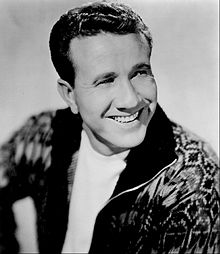
Back مارتي روبينز Arabic مارتى روبينز ARZ مارتی روبینز AZB Марти Робинс Bulgarian مارتی ڕۆبینز CKB Marty Robbins Czech Marty Robbins German Marty Robbins Spanish Marty Robbins Finnish Marty Robbins French
Marty Robbins | |||||||
|---|---|---|---|---|---|---|---|
 Robbins in 1966 | |||||||
| Born | Martin David Robinson September 26, 1925 Glendale, Arizona, U.S. | ||||||
| Died | December 8, 1982 (aged 57) Nashville, Tennessee, U.S. | ||||||
| Occupations |
| ||||||
| Years active | 1948–1982 | ||||||
| Spouse |
Mari Baldwin (m. 1948) | ||||||
| Children | 2 | ||||||
| Musical career | |||||||
| Genres | |||||||
| Instruments |
| ||||||
| Discography | Marty Robbins discography | ||||||
| Labels | Columbia, Decca | ||||||
| Website | martyrobbins | ||||||
| NASCAR Cup Series career | |||||||
| 35 races run over 13 years | |||||||
| Best finish | 48th (1974) | ||||||
| First race | 1966 Nashville 400 (Nashville) | ||||||
| Last race | 1982 Atlanta Journal 500 (Atlanta) | ||||||
| |||||||
| NASCAR Grand National East Series career | |||||||
| 1 race run over 1 year | |||||||
| First race | 1972 Gamecock 200 (Columbia) | ||||||
| Last race | 1972 Gamecock 200 (Columbia) | ||||||
| |||||||
| ARCA Menards Series career | |||||||
| Best finish | 72nd (1981) | ||||||
| First race | 1981 Talladega ARCA 200 (Talladega) | ||||||
| Last race | 1981 Talladega ARCA 200 (Talladega) | ||||||
| |||||||
| Statistics current as of June 12, 2022. | |||||||
| Signature | |||||||
Martin David Robinson (September 26, 1925 – December 8, 1982), known professionally as Marty Robbins, was an American singer, songwriter, multi-instrumentalist, and NASCAR racing driver. Robbins was one of the most popular and successful country and western singers for most of his nearly four-decade career,[2][3][4] which spanned from the late 1940s to the early 1980s. He was also an early outlaw country pioneer.[5]
Born in Glendale, Arizona, Robbins taught himself guitar while serving in the U.S. Navy during World War II, and subsequently drew fame performing in clubs in and around his hometown. In 1952, he released his first No. 1 country song, "I'll Go On Alone". Four years later, he released his second No.1 hit "Singing the Blues", and one year later, released two more No. 1 hits, "A White Sport Coat" and "The Story of My Life". In 1959, Robbins released his signature song, "El Paso", for which he won the Grammy Award for Best Country & Western Recording. The song began Robbins' association with western balladry, a style which would become a staple of his career. Later releases that drew critical acclaim include "Don't Worry", "Big Iron", "Devil Woman" and "Honkytonk Man", the last for which the 1982 Clint Eastwood film is named, and in which Robbins made his final appearance before his death.
Over the course of his career, Robbins recorded more than 500 songs and 60 albums, and won two Grammy Awards, was elected to the Country Music Hall of Fame and Nashville Songwriters Hall of Fame, and was named the 1960s Artist of the Decade by the Academy of Country Music. His songs "El Paso" and "Big Iron" were ranked by the Western Writers of America among the Top 100 Western songs of all time. Robbins was a commercial success in both the country and pop genres, and his songs were covered by many other famous artists, including Johnny Cash, the Grateful Dead and Elvis Presley. Johnny Cash noted, "there's no greater country singer than Marty Robbins."[6] His music continues to have an influence in pop culture today, featuring prominently in several films, television shows and video games.
- ^ Richard S. Ginell. "Ruby Ann: Rockin' Rollin' Robbins, Vol. 3 – Marty Robbins | Songs, Reviews, Credits, Awards". AllMusic. Retrieved August 17, 2015.
- ^ "Marty Robbins Biography". AllMusic, RhythmOne, LLC. Retrieved December 29, 2016.
- ^ "Marty Robbins Biography". A&E Television Networks, LLC. Retrieved December 29, 2016.
- ^ "About Marty Robbins". Country Music Television, Inc., a division of Viacom International Inc. Archived from the original on December 28, 2012. Retrieved December 29, 2016.
- ^ Fraser, Max (2018). "Down in the Hole: Outlaw Country and Outlaw Culture". Southern Cultures. 24 (3): 83–100. doi:10.1353/scu.2018.0034. ISSN 1534-1488. S2CID 149612754.
- ^ Cash, Johnny (2021). Johnny Cash: The Last Interview: and Other Conversations. Melville House Publishing. p. 53. ISBN 978-1-612-19893-4.